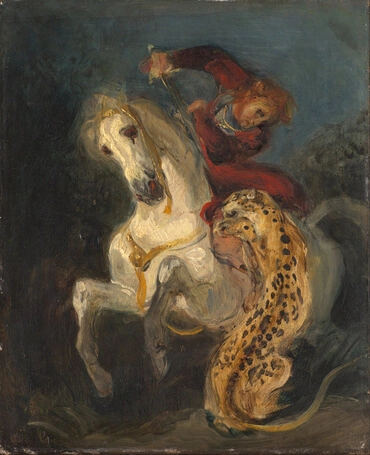1
Und es war ein Mann von
amathajim-Zophim, vom Gebirge Ephraim, und sein Name war Elkana, der Sohn Jerochams, des Sohnes Elihus, des Sohnes Tochus, des Sohnes Zuphs, ein Ephratiter. (O. ein Ephraimiter; vergl.
icht. 12,5, sowie die Anm. zu
icht. 17,7)
2
Und er hatte zwei Weiber: der Name der einen war Hanna, und der Name der anderen Peninna; und Peninna hatte Kinder, aber Hanna hatte keine Kinder.
3
Und dieser Mann ging von Jahr zu Jahr aus seiner Stadt hinauf, um Jehova der Heerscharen anzubeten und ihm zu opfern zu Silo; und daselbst waren die beiden Söhne Elis, Hophni und Pinehas, Priester Jehovas.
4
Und es geschah an dem Tage, da Elkana opferte, da gab er seinem Weibe Peninna und allen ihren Söhnen und ihren Töchtern Stücke;
5
aber Hanna gab er ein doppeltes Stück, denn er liebte Hanna; aber Jehova hatte ihren Mutterleib verschlossen.
6
Und ihre Widersacherin kränkte sie mit vieler Kränkung, um sie aufzubringen, weil Jehova ihren Mutterleib verschlossen hatte.
7
Und so wie er das Jahr für Jahr tat, also kränkte sie sie, so oft sie zum Hause Jehovas hinaufzog; und sie weinte und aß nicht.
8
Und Elkana, ihr Mann, sprach zu ihr: Hanna, warum weinst du? und warum issest du nicht? und warum ist dein Herz betrübt? Bin ich dir nicht besser als zehn Söhne?
9
Und Hanna stand auf nach dem Essen und nach dem Trinken zu Silo. Eli, der Priester, saß aber auf dem Stuhle an einem der Türpfosten des Tempels Jehovas.
10
Und sie war bitteren Gemütes, und sie flehte zu Jehova und weinte sehr.
11
Und sie tat ein Gelübde und sprach: Jehova der Heerscharen! wenn du das Elend deiner Magd ansehen und meiner gedenken und deine Magd nicht vergessen wirst und wirst deiner Magd männlichen Samen geben, so will ich ihn Jehova geben alle Tage seines Lebens; und kein Schermesser soll auf sein Haupt kommen.
12
Und es geschah, als sie lange vor Jehova betete, daß Eli ihren Mund beobachtete.
13
Hanna aber redete in ihrem Herzen; nur ihre Lippen bewegten sich, aber ihre Stimme wurde nicht gehört; und Eli hielt sie für eine Trunkene.
14
Und Eli sprach zu ihr: Bis wann willst du dich wie eine Trunkene gebärden? Tue deinen Wein von dir!
15
Aber Hanna antwortete und sprach: Nein, mein Herr! ein Weib beschwerten Geistes bin ich; weder Wein noch starkes Getränk habe ich getrunken, sondern ich schüttete meine Seele vor Jehova aus.
16
Setze nicht deine Magd einer Tochter Belials gleich; denn aus der Fülle meines Kummers und meiner Kränkung habe ich bisher geredet.
17
Und Eli antwortete und sprach: Gehe hin in Frieden; und der Gott Israels gewähre deine Bitte, die du von ihm erbeten hast!
18
Und sie sprach: Möge deine Magd Gnade finden in deinen Augen! Und das Weib ging ihres Weges und aß, und ihr Angesicht war nicht mehr dasselbe.
19
Und sie machten sich des Morgens früh auf und beteten an vor Jehova; und sie kehrten zurück und kamen in ihr Haus nach
ama. Und Elkana erkannte Hanna, sein Weib, und Jehova gedachte ihrer.
20
Und es geschah nach Umlauf der Zeit, da ward Hanna schwanger und gebar einen Sohn; und sie gab ihm den Namen Samuel (H. Schemuel: von Gott erhört) :denn von Jehova habe ich ihn erbeten.
21
Und der Mann Elkana ging hinauf mit seinem ganzen Hause, um Jehova das jährliche Schlachtopfer zu opfern und sein Gelübde zu erfüllen.
22
Aber Hanna ging nicht hinauf; denn sie sprach zu ihrem Manne: Bis der Knabe entwöhnt ist, dann will ich ihn bringen, daß er vor Jehova erscheine und dort bleibe auf immer.
23
Und Elkana, ihr Mann, sprach zu ihr: Tue was gut ist in deinen Augen; bleibe, bis du ihn entwöhnt hast; nur möge Jehova sein Wort aufrecht halten! So blieb das Weib und säugte ihren Sohn, bis sie ihn entwöhnt hatte.
24
Und sobald sie ihn entwöhnt hatte, brachte sie ihn mit sich hinauf nebst drei Farren und einem Epha Mehl und einem Schlauch Wein, und brachte ihn in das Haus Jehovas nach Silo; und der Knabe war noch jung.
25
Und sie schlachteten den Farren und brachten den Knaben zu Eli.
26
Und sie sprach: Bitte, mein Herr! So wahr deine Seele lebt, mein Herr, ich bin das Weib, das hier bei dir stand, um zu Jehova zu flehen.
27
Um diesen Knaben habe ich gefleht, und Jehova hat mir meine Bitte gewährt, die ich von ihm erbeten habe.
28
So habe auch ich ihn Jehova geliehen; alle die Tage, die er lebt, (W. ist) ist er Jehova geliehen. Und er betete (O. sie beteten) daselbst Jehova an.







